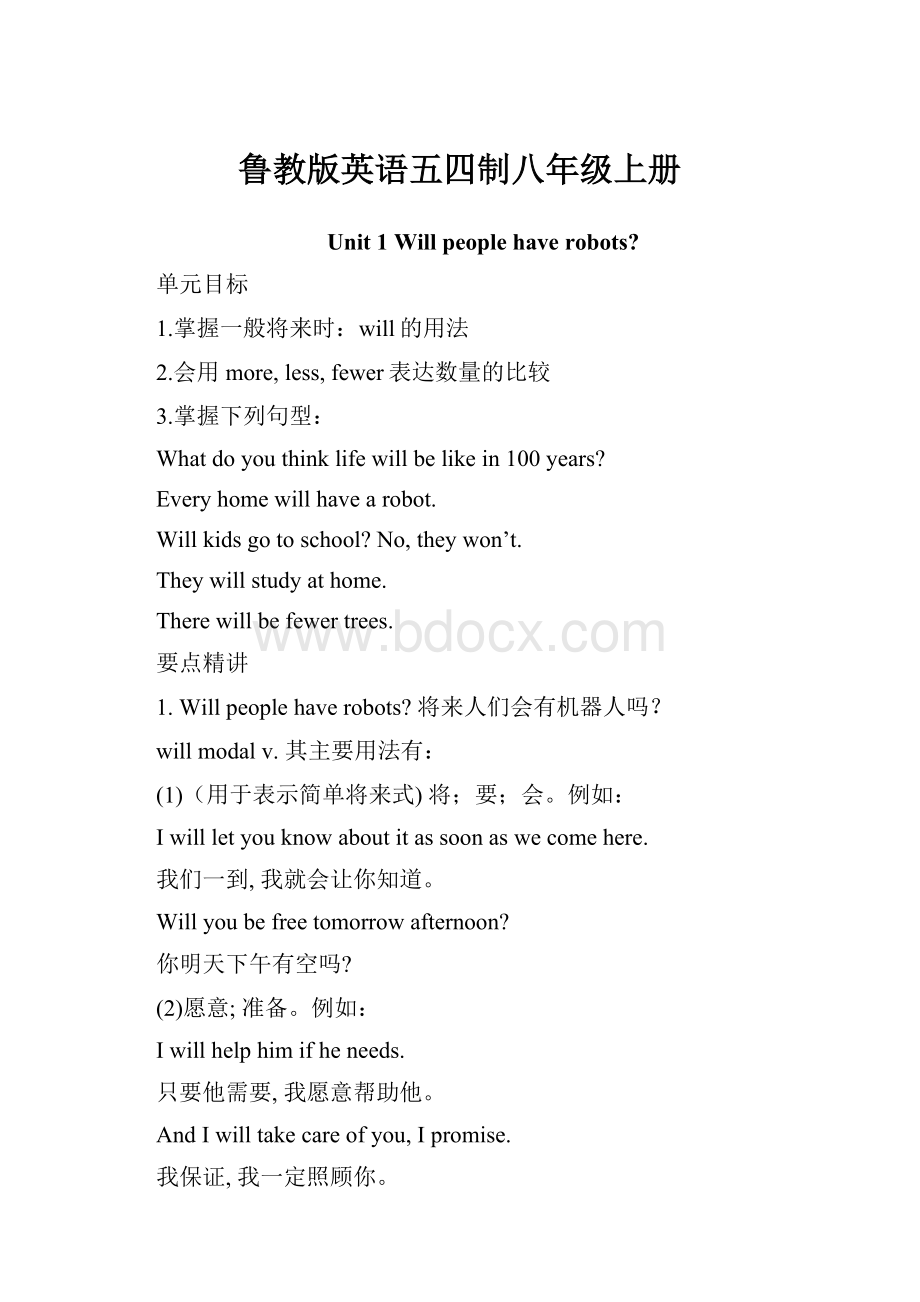鲁教版英语五四制八年级上册.docx
《鲁教版英语五四制八年级上册.docx》由会员分享,可在线阅读,更多相关《鲁教版英语五四制八年级上册.docx(109页珍藏版)》请在冰豆网上搜索。

鲁教版英语五四制八年级上册
Unit1Willpeoplehaverobots?
单元目标
1.掌握一般将来时:
will的用法
2.会用more,less,fewer表达数量的比较
3.掌握下列句型:
Whatdoyouthinklifewillbelikein100years?
Everyhomewillhavearobot.
Willkidsgotoschool?
No,theywon’t.
Theywillstudyathome.
Therewillbefewertrees.
要点精讲
1.Willpeoplehaverobots?
将来人们会有机器人吗?
willmodalv.其主要用法有:
(1)(用于表示简单将来式)将;要;会。
例如:
Iwillletyouknowaboutitassoonaswecomehere.
我们一到,我就会让你知道。
Willyoubefreetomorrowafternoon?
你明天下午有空吗?
(2)愿意;准备。
例如:
Iwillhelphimifheneeds.
只要他需要,我愿意帮助他。
AndIwilltakecareofyou,Ipromise.
我保证,我一定照顾你。
(3)(用于请求某人做某事)好吗;行吗。
例如:
Youwillallowustosetoffatonce.
请允许我们立刻出发。
Helpmewiththisbaggage,willyou?
请你帮我搬这件行李好吗?
(4)(用于表示推测,与must类似)大概,可能。
例如:
ThemanwiththeumbrellawillbethePrimeMinister.
拿着雨伞的那个人准是首相。
(5)(表示总是如此)惯于,总是。
例如:
Oilwillfloatonwater.
油总是浮在水面上。
Manwilldie.
人总是要死的。
2.Therewillbemore/less/fewercars.将会有更多/更少/更少汽车。
fewer和less用法辨析:
(1)都是比较级形式,意思都是“较少的;更少的”。
但前者主要用于具体的、可数名词之前,后者主要用于抽象的、不可数名词之前。
例如:
Therewillbelesscleanwaterandfewerbirdsbecauseofpollution.
由于污染,干净的水和鸟儿都将会更少。
(2)fewerthan比……更少;少于。
例如:
ThestudentsinClassTwoarefewerthanClassOnethisyear.
今年二班的学生人数比一班的少。
(3)lessthan少于;小于。
例如:
lessthanthreeweeks
少于三个星期
HehaslessstrengththanI.
他力气比我小。
3.Imighteverkeepapetparrot!
我可能喂养一只宠物鹦鹉!
keepv.保持;维持;喂养。
keep常用在下列结果中:
(1)keep+sb./sth.+adj.使某人/某物…。
例如:
Thejobkeptusbusyforalmostayear.
这项工作让我们忙碌了几乎一年。
(2)keep+adj.保持。
例如:
Theoldmanburntafiretokeepwarm.
这位老人升起了炉子取暖。
(3)keep+sb./sth.doing让某人/某物继续做某事,例如:
Ifeesorrytokeepyoutwowaitingformeintheyardforanhour.
对不起,让你们俩在院子里等了我一个小时。
(4)keep+doing继续做,坚持做。
例如:
Hekeptrunningafterher,tryingtocatchher.
他不停地在追赶她,试图抓到她。
4.Ontheweekend,I’llbeabletodressmorecasually.周末,我要穿得休闲一些。
dress的主要用法有:
(1)dressv.穿衣;装饰;给……穿衣。
例如:
Thetwoyoungmendressesasstudents.
这两个年轻人穿得像学生。
LittleMaryistooyoungtodressherself.
小玛丽太小了,还不会自己穿衣服。
(2)dressn.连衣裙;服装。
例如:
Sheworeacoatwithadressunderneath.
她穿着一件大衣,里面套着一条连衣裙。
We’llwearourbestdressthatdayforhisbirthdayparty.
那天,我们要穿着最好的衣服出席他的生日晚宴。
(3)dressup穿上盛装;装饰。
例如:
Thecoupledresseduptoattendthewedding.
那对夫妇盛装参加这个婚礼。
Theyaredressinguptheroom.
他们正在装饰这个房间。
5.Scientistsarenowtryingto…科学家们现在正努力……
try构成的主要短语有:
(1)trytodo/trydoing试图;努力。
例如:
Hetriedtosolvethemathproblem,buthecouldn’t.
他试图解答这个数学题,但未能成功。
Thetigertriedclimbingthetalltree.
那只老虎试着爬上那棵大树。
(2)tryon试穿(戴);测验或试用。
例如:
PleasetryontheslippersIgaveyou.
请试穿一下我送给你的那双拖鞋。
Heboughtmeapairofglovesandletmetrythemon.
他给我买了一双手套,让我试戴一下。
(3)tryone’shandat尝试。
例如:
Itriedmyhandatplayingtheviolin,butfoundittoodifficulttolearn.
我试着拉小提琴,但认为拉小提琴太难学了。
6.Japanesecompanieshavealreadymaderobotswalkanddance.日本的很多公司都可以使机器人走路和跳舞了。
make作为及物动词,有一种特殊用法,即“使役用法”,在表示“使(要)某人(事物)做什么(怎么样)”时,它除了要有一个“宾语”之外,还需要宾语后面带上一个宾语补足语,这样,整个句子的意思才能完整。
可作宾语补足语的词或词组有:
(1)动词原形,即不带to的动词不定式。
例如:
Theymadethemachinegofaster.
他们使机器运转得更快。
LiLimakesthebabystopcryingwithatoy.
李丽用玩具使婴儿停止啼哭。
(2)形容词(词组)。
例如:
Howdidyoumakeallthestreetaslightasday?
你是怎样使整条街道亮如白昼的?
ShemadetheshoesreadywhenIgotthere.
当我到那里的时候,她已经把鞋准备好了。
(3)名词(词组)。
例如:
Birdsmakethetreestheirnests.
鸟儿把树做为它们的巢穴。
AllworkandnoplaymakesJackadullboy.
只有工作没有娱乐使杰克脑子极为迟纯。
(只工作不学习,聪明的孩子也变傻)。
(4)介词短语。
例如:
Pleasemakeyourselvesathome,kids.
孩子们,请不要拘束。
典型例题
【例1】例:
我正努力学习,准备参加英语考试。
误:
IamstudyinghardandIwilltryformyEnglishexams.
正:
IamstudyinghardandIamgoingtotryformyEnglishexams.
【解析】“begoingto”表示计划、打算要做某事。
E.g.Heisgoingtovisithisfriends.还表示某种迹象表明会发生某事.e.g.Lookattheclouds.It’sgoingtorain.而“Will+动词原形”指对将来事物的预见、表示意愿、决心。
E.g.Iwillwaitforyouuntilyoucome.在单纯预测未来时,二者可以互换,但在此题中只能用begoingto,而不能用will。
【例2】Wecando_____workwith_____moneyand_____people.
A.more,more,lessB.more,less,fewer
C.less,less,moreD.less,fewer,fewer
【答案】B
【解析】句意是“用较少的人和钱做较多的事”。
people是可数名词,money是不可数名词,首先排除A和D。
根据句意排除C。
针对训练
1.不要太疲劳,不然会使你生病的。
Don't______tootired.Oritwill_________yousick.
2.Theexperimentwas____easierthanwehadexpected.
A.more B.muchmore C.much D.moremuch
3.I’mgoing_______(go)schoolbybiketomorrow.
Atowillgo B.togoto C.goto D.togo
4.Theclass____oneverythingtheyhavelearntthisyear.
A.isgoingtobeexamining B.aregoingtoexamine
C.isgoingtobeexamined D.aregoingtobeexamined
5.Mycousinisverybusywithhiswork.Hehas_____timetoreadnewspaper.
A.littleB.fewC.alittleD.afew
中考链接
(2010河南省)RebuildinginYushubegansoonaltertheearthquake,anditwilllongintothefuture.
A.reachB.keepC.stopD.last
【答案】D
(2010山东聊城市)----Asingleroom,please.
----OK.Willyouplease______meyourIDcard?
----Hereyouare.
A.tellB.serveC.sendD.show
【答案】D
(2010.河北省卷,38.1)Thistermover.Thesummervacationiscomingintwoweeks.
A.isB.wasC.hasbeenD.willbe
【答案】D
(2010.江苏省盐城市7.1)I'msorryIleftthebookathome.I______itheretomorrow,Ipromise.
A.bringB.willbringC.broughtD.havebrought
【答案】B
(2010·湖北省黄冈市,44,1)-CouldyoutellmewhenMr.Li______inHuanggang?
--Sure.Whenhe_______,I'llcallyou.
A.arrives;willarriveB.willarrive;arrives
C.arrives;arrivesD.willarrive;willarrive
【答案】B
(2010湖北省黄冈市,37,1)-What'sthelow-carbonlifestylelike?
--Save_______energy,produce________carbon.
A.more;moreB.less;moreC.less;lessD.more;less
【答案】D
(2010湖北省荆门市,32,1)Allofuswanttodomoreworkwith_____timeand____workers.
A.fewer,lessB.less,fewerC.more,muchD.less,more
【答案】B
单元测试
一、单项选择
1.---Don'tforgettocometomybirthdaypartytomorrow.
---______.
A.Idon'tB.Iwon'tC.Ican'tD.Ihaven't
2.Hesaidhe________meapresentunlessI_______indoingtheexperiment.
A.hadnotgiven;hadnotsucceededB.wouldnotgive;succeed
C.willnotgive;succeedD.wouldnotgive;willsucceed.
3.Thepianosintheothershopwillbe____,but____.
A.cheaper,notasbetter B.morecheap,notasbetter
C.cheaper,notasgood D.morecheap,notasgood
4.Theexperimentwas____easierthanweexpected.
A.more B.muchmore C.much D.moremuch
5.There_________abasketballmatchthisafternoon.(B)
Aisgoingtobe Bisgoingtohave Caregoingtobe Daregoingtohave
6.Ipromisethatthismatter_____nextweek.
A.willbetakencare B.willtakecareof
C.willtakegoodcare D.willbetakencareof
7.Thesedictionaries_____thelibraryagain(byyou).
A.willbetakenoutof B.won’tbetakenoutof
C.willtakeoutof D.won’ttakeoutof
8.Anexhibitionofpainting_____attheartmuseumwhenhecomesbackfromabroad.
A.isgoingtohold B.isgoingtobeheld
C.aregoingtohold D.aregoingtobeheld
9._______anEnglishpartyinourschoolthisevening.
A.TherewillbeB.Thereisgoingtohave
C.TherewillhaveD.Thereisgoinghave
10.----Shallwegoskatingorstayathome
----Which___do
A.doyouratherB.wouldyouratherC.willyouratherD.shouldyourather
二、用所给动词的适当形式填空
11.Whatisshedoingnow?
She_______ _______(play)thekitenow.
12.Wheredidhegoonvacation?
He___________(stay)athome.
13.Iamtirednow.I_________(study)latelastnight.
14.Mymom________(like)thecolorofblue,butmygrandparents________(like)thecolorofyellow.
15.A:
I_______________________(feel)wellnow.
B:
Youshouldgotothedoctor.
Unit2WhatshouldIdo?
单元目标
1.学会使用情态动词should、could
2.掌握下列句型
MybrotherplayshisCDtooloud.
WhatshouldIdo?
Whydon’tyoutalktohimaboutit?
3.能够谈论自己的麻烦和问题。
4.能够为他人的问题找到合理的解决办法,提出相应的建议。
5.能够从他人的建议中为自己的问题找到解决办法。
要点精讲
1.情态动词should,could的用法
(1)should是情态动词,它的基本用法是必须和其他动词一起构成谓语。
情态动词没有人称和数的变化,意为"应该......"。
should(应当,应该)用于所有人称,表示劝告或建议。
eg.Youshouldwaitalittlemore.
你应该再多等一会儿。
---Ihaveaverybadcold.我感冒很厉害。
---Youshouldliedownandhavearest.你应该躺下,多喝水。
(2)在这个单元中我们还学到用"could"表示建议,这时could不是can的过去式,而表示比should更加委婉的建议。
---Ineedsomemoneytopayforthesummercamp.
----Youshould/couldborrowsomemoneyfromyourbrother.
2.重点句型
(1)What’swrong?
怎么了?
What’sthematter?
怎么了?
这两句话的意思是一样的。
使用时需要注意:
①如果表示“……怎么样了”,后面用介词with连接。
例如:
What’sthematter/wrongwiththeboy?
那个男孩怎么了?
What’sthematter/wrongwithherleg?
她的腿怎么样了?
②当用作从句时,它们的语序不变。
例如:
I’venoideawhatwasthematter/wrongwithMary.
我不知道玛丽怎么了。
Mymotheraskedwhatwasthematter/wrongwithme.
妈妈问我出什么事了。
(2)Myclothesareoutofstyle.我的衣服过时了。
outofstyle=outoffashion意思是“过时的;不时髦的”。
例如:
Ithinksomecolorsnevergooutofstyle,suchasblack,white.
我认为有的颜色是永远不会过时的,比如白色和黑色。
outofstyle的反义短语是instyle=infashion,意思是“流行的;时髦的”。
例如:
Herclothesarealwaysinstyle.
她的衣服总是很时髦。
Shedressesinstyle.
她穿着很时髦。
Dressesmaybeinstyleoneyearandoutofstylethenext.
服装有可能会今年时髦,而明年过时。
(3)No,hedoesn’thaveanymoney,either.不,他也没有钱。
either在此的意思是“也;又”。
英语中,too和also也有此意,其用法区别是:
①too和also一般都用于肯定句,too放在句尾,通常用句号隔开,also放在实义动词前、联系动词后。
例如:
Herunsfast,too.=Healsorunsfast.
他跑得也很快。
Youmaylookafteryourselveswell,too.=Youmayalsolookafteryourselveswell.
你也要照顾好自己。
②either主要用于否定句,放在句尾,通常用逗号隔开。
例如:
Youdon’tknowaboutit,Idon'tknowit,either.
你不知道,我也不知道。
(4)Theyarethesameasmyfriends’clothes.它们和我朋友的衣服一模一样。
thesameas,thesamethat,thesameto,thesamewith的用法比较:
①thesameas的意思是“和……一样”。
例如:
ThinkthesameasIdo?
跟我想的一样吗?
ThisisthesamebagasIlostyesterday.
这个包跟我昨天丢失的那个包一样。
②thesamethat表示“同一个”,强调的是物体本身的相同,指代同一物体。
例如:
T